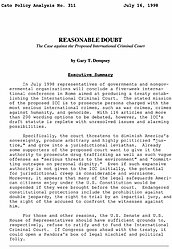Specifically, the court threatens to diminish America’s sovereignty, produce arbitrary and highly politicized “justice,” and grow into a jurisdictional leviathan. Already some supporters of the proposed court want to give it the authority to prosecute drug trafficking as well as such vague offenses as “serious threats to the environment” and “committing outrages on personal dignity.” Even if such expansive authority is not given to the ICC initially, the potential for jurisdictional creep is considerable and worrisome. Moreover, it appears that many of the legal safeguards American citizens enjoy under the U.S. Constitution would be suspended if they were brought before the court. Endangered constitutional protections include the prohibition against double jeopardy, the right to trial by an impartial jury, and the right of the accused to confront the witnesses against him.
For those and other reasons, the U.S. Senate and U.S. House of Representatives should have sufficient grounds to, respectively, refuse to ratify and to fund the International Criminal Court. If Congress goes ahead with the treaty, it could open a Pandora’s box of legal mischief and political folly.


